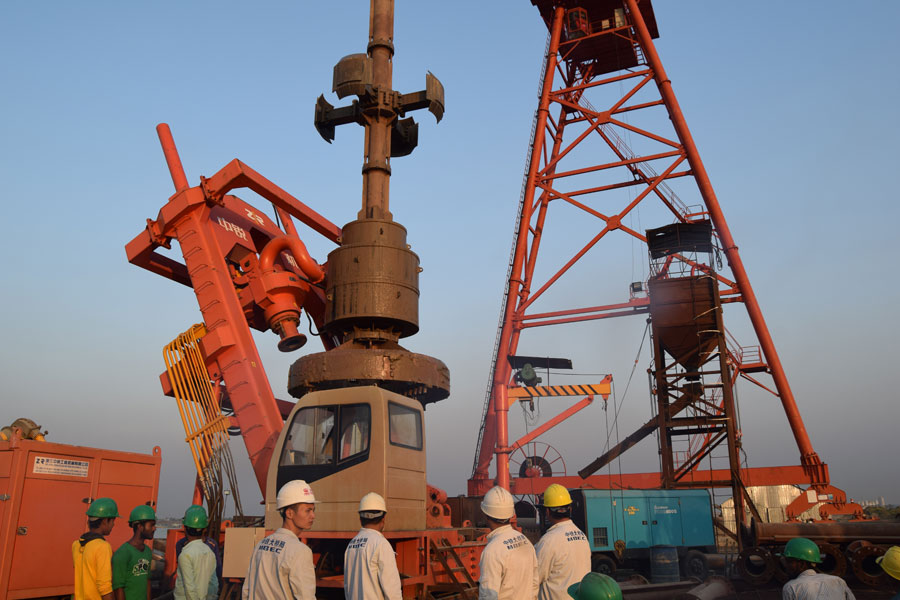Bridging B&R, Bangladesh


MBEC announces its arrival on world stage with big infrastructure project
With a yellow safety helmet on and in an orange life jacket, M.D. Shohel Rana appears proud after yet another day working on Bangladesh's Padma Bridge, the country's largest infrastructure project as well as the largest international bridge project undertaken by Chinese companies.
The venture is called a dream bridge. For, it is expected to promote trade, boost the national economy and alleviate poverty. Rana, just 28, is a technician at the Padma Bridge project's research center of China Major Bridge Engineering Co Ltd, or MBEC, the company that is executing the dream project.
A wholly owned subsidiary of State-owned China Railway Group Ltd, MBEC has employed Rana for six years now, to give the project in his country a concrete shape.
Rana has received a lot of hand-holding and guidance from his Chinese supervisors such as Yang Pinxiang. Their symbiotic relationship symbolizes not just bilateral cooperation but MBEC's approach to its go-global strategy. Rana is now capable of undertaking many engineering tests independently.
"Padma Bridge is my second project. I will add this experience to my resume once the construction is completed, which should hold me in good stead in the future."
Based in China's central Hubei province, MBEC has designed and constructed more than 2,000 bridges at home and abroad with a total length of over 2,000 kilometers. The company said it has 10 overseas projects in the works, accounting for around 10 percent of its total projects.
"We aim to gradually turn into an international firm with key competence in executing global-scale projects," said Liu Ziming, chairman of MBEC. "We'll seek more opportunities to secure a larger market share in the overseas market."
Over the past decade, MBEC has built more than 30 bridges in over 10 countries and regions, including Tanzania, Zambia and Morocco. In 2014, the Bangladeshi government awarded MBEC a $1.55 billion contract to build core structure of the bridge.
The 25-meter-wide and 10-km-long bridge will be built over the Padma River, one of the three major rivers in Bangladesh. Once completed, the travel time between the capital and the southern city of Khulna will be shortened to around three hours from 13 hours, and the local gross domestic product is expected to rise by 1.2 percent.
Liu said the project has more than 400 Chinese employees and over 2,000 local employees, as part of the company's broader efforts to facilitate localization in overseas markets.
Now, MBEC wants to expand into more markets, especially countries and regions related to the Belt and Road Initiative.
"Having years of design and construction experience, we also would like to contribute to the infrastructure projects in overseas markets. We'll conduct more research to have a better understanding of the market demand and then provide services that are needed."
Liu said developed European countries and the United States are competitive in terms of infrastructure construction, while China has also gained a lot of experience in recent years, and is gradually catching up with them.
"China used to lag behind those developed countries in terms of participating in the global competition (for infrastructure projects). And now we need to ramp up the efforts to target overseas markets and learn from leading countries."
So, MBEC is gearing up for digital transformation: that is, the transformation of business activities by applying digital technologies to various aspects of the work, to enhance work efficiency and improve bridges' quality.
In terms of management, the company has introduced standardized, fine-tuned means to improve the project quality and avoid risks. For example, it will choose factory work and land operations instead of aerial operations and offshore works.
Deborah Lehr, CEO and founding partner of Basilinna and vice-chairwoman of The Paulson Institute, a Chicago-based think tank, said a whole industry is being built around the Belt and Road Initiative's needs. And it is estimated to create a need for up to $2 trillion worth of infrastructure financing each year across the countries and regions relating to the initiative.
"China is such a significant economic player, and the Belt and Road Initiative could be globally transformational," Lehr said.
According to her, as Chinese companies continue to expand globally, they also need to be more aware of cultural and regulatory challenges in the overseas markets.
"Overcoming miscommunications is the most complicated part, and the business facts are much easier to resolve. And they also need to learn about the local regulatory structure," she said.
Liu agreed, saying the company is aware of both cultural and regulatory challenges in overseas markets.
"We need to understand the culture in different countries and regions and obey the local culture and rules accordingly," Liu said. "I believe we will gradually transform into an international company with significant momentum in the global market."
- Xi's report at key CPC meeting further strengthens global confidence in China
- Building bridges, boring tunnels
- China's Belt and Road Initiative to continue gaining traction in ASEAN countries: AMRO economist
- CEE nations' niche markets can boost Belt & Road push
- M&A deals in Belt & Road economies increase by 81%




































